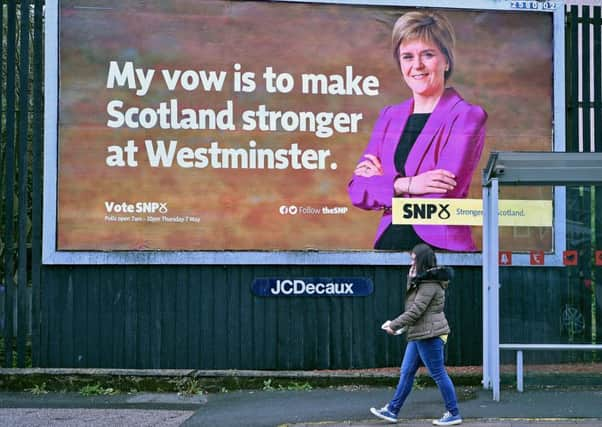General election: SNP coverage ‘mostly negative’


The research, carried out by Loughborough University’s Communications Research Centre (CRC) between March 30 and April 22, was conducted as part of the third instalment in a series of reports scrutinising national news coverage of the general election campaign.
Among the headline findings were that coverage of the Nationalists has increased but so has the negative tone of reporting; First Minister and SNP leader Nicola Sturgeon is the most prominent politician in the campaign after David Cameron and Ed Miliband despite not standing for a Westminster seat, and women are ‘quite marginalised’ in the campaign, with Ukip deputy chair Suzanne Evans the most prominent female after Ms Sturgeon, Plaid Cymru leader Leanne Woods and Natalie Bennett, leader of the Green Party.
Advertisement
Hide AdAdvertisement
Hide AdThe report found that, following Ms Sturgeon’s appearance on ITV’s Leaders’ Debate on April 2 - which fell during the first sample period - coverage of the SNP was generally positive.
However, during the second sample period (March 30 - April 15), negative coverage of the party ‘exceeded levels of negativity for Labour in the same period’.
The prospect of the SNP sweeping to victory in Scotland and thus playing a potential role in a new parliament was heightened with yesterday’s TNS Scotland poll suggesting the Nationalists are on track to win 57 of the 59 Scottish seats.
But talk of a post-election Labour / SNP deal led to attacks by London mayor Boris Johnson and former Prime Minister Sir John Major.
Writing in the Daily Telegraph, Mr Johnson described the SNP as ‘literally anti-British’ and ‘lefties on steroids’, adding: “You wouldn’t get Herod to run a baby farm, would you? It would not normally occur to you to interview a convicted jewel thief for the post of custodian of the Tower of London.
“Any such course of action would be totally nuts. So can someone tell me why in the name of all that is holy there are some apparently rational people who are even contemplating the elevation of the Scottish Nationalist Party to a position of effective dominance in the government of the United Kingdom - an entity that they are sworn to destroy?”
And Sir John warned that any form of Labour / SNP alliance would be a ‘recipe for mayhem’ and would lead to an ‘weak and unstable government’, prompting a backlash from Ms Sturgeon, who branded his comments ‘an affront to democracy’, while Labour leader Ed Miliband accused the Conservatives of ‘threatening the integrity of the United Kingdom.’
The CRC also found that the Conservatives received the most ‘quotation time’ on television, followed by Labour, the Liberal Democrats, Ukip and then the SNP, while The Sun and Daily Mail newspapers gave consistently negative coverage of both Labour and the SNP, and consistently positive coverage of the Conservatives.
Advertisement
Hide AdAdvertisement
Hide AdThe report also determined that the Daily Mirror’s coverage of the SNP has ‘varied between balanced and marginally positive’ while the Liberal Democrats are attracting ‘little evaluative coverage or commentary of any kind’.
• The research examined The Guardian, The Independent, The Times, Daily Telegraph, Daily Mail (English edition), Daily Express (English edition), Daily Mirror, The Sun (English edition), Daily Star and the Metro (English edition. The TV programmes involved were Channel 4 News, Channel 5 News, BBC1 News at 10, ITV1 News at 10, BBC2 Newsnight and Sky News from 8pm - 8.30pm.